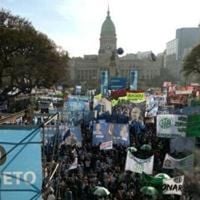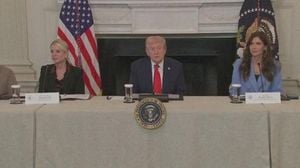On September 19, 2025, the mood in Buenos Aires was tense and uncertain. The country’s battered currency, the peso, had just closed at a record low of 1,515 pesos to the dollar, smashing through the upper limit of the government’s carefully managed trading band. In the corridors of power, nerves were fraying. Luis Caputo, Argentina’s Economy Minister, had left the Casa Rosada after a cabinet meeting barely a week earlier, and by now, the country’s libertarian president, Javier Milei, was facing a full-blown crisis of confidence.
According to Bloomberg, investors had already yanked $1 billion out of Argentina, spooked by the possibility that Milei—who swept into office last year on a wave of free-market enthusiasm—might abandon his defense of the peso and let it collapse, just as so many of his predecessors had done. The exodus of capital was swift and brutal, and the consequences were being felt on every corner, from the trading floors to the bustling markets where ordinary Argentines were scrambling to protect their savings.
On Friday, Milei addressed the stock exchange in the central city of Cordoba, but instead of calming nerves, he pointed fingers. According to the International Business Times, Milei blamed what he called "political panic" for rattling the markets, saying the left-wing opposition was deliberately sowing chaos to undermine his government ahead of crucial midterm elections on October 26. "They are creating spiraling political panic in the market and generating enormous disorganization in terms of sovereign risk," Milei declared, his tone defiant but tinged with frustration.
The president’s message was clear: Argentina’s economic woes were being exacerbated by political sabotage. He accused his opponents of "throwing a spanner in the works"—an accusation that resonated with his supporters but did little to reassure investors or the broader public. The peso had tumbled 4.48 percent in just one week, a staggering drop that underscored the fragility of the country’s finances and the mounting doubts about Milei’s leadership.
The Central Bank, meanwhile, was forced to intervene for the first time in five months, selling $432 million in reserves over two frantic days to prop up the currency. This intervention, reported by IBTimes, came despite strict conditions attached to a $20 billion bailout package agreed with the International Monetary Fund back in April. Under the terms of that deal, Argentina was barred from selling dollar reserves unless the exchange rate hit the upper limit of the floating band—a threshold that was now, for the first time, being breached.
Economy Minister Luis Caputo, facing mounting pressure, went on television Thursday night and made a bold promise. Speaking to the Carajo channel, Caputo declared, "We are not going to deviate from the program." He insisted that the Central Bank would sell "every last dollar" of its reserves if necessary to defend the peso from collapse. It was a dramatic pledge—one that signaled both determination and desperation. For many, it was a stark reminder of the country’s dwindling options.
The peso’s slide was not just about numbers on a screen. In Argentina, where memories of past crises linger and most people save in US dollars rather than the long-ailing peso, the exchange rate is a deeply political issue. According to IBTimes, economists have warned that Milei’s efforts to keep the peso overvalued are now backfiring, damaging the competitiveness of Argentina’s crucial export sector and making it even harder for the country to earn the dollars it so desperately needs.
The political backdrop to this crisis was equally dramatic. Milei’s party suffered a humiliating defeat on September 7 in Buenos Aires’ provincial polls—a result widely seen as a test of his support ahead of the midterms. The rout shattered his aura of electoral invincibility and emboldened his opponents in Congress. As reported by IBTimes, Congress has grown increasingly resistant to Milei’s efforts to shrink the state, rejecting his veto of a law on funding for public universities and the country’s largest pediatric hospital on September 17. Earlier in the month, lawmakers also overturned his veto of a law on allowances for people with disabilities.
Complicating matters further, Milei has been dogged by a corruption scandal involving his sister and closest confidante, Karina Milei. The controversy has eroded his support base and fueled the perception that his administration, despite its promises of radical change, is not immune to the same old problems that have plagued Argentine politics for decades.
The stakes could hardly be higher. The October 26 midterm elections loom large, with the potential to either bolster or cripple Milei’s reform agenda. For now, though, the president is caught between the demands of international creditors, the skepticism of investors, and the anger of a public weary of austerity and instability. His election in 2023 was initially cheered by markets, but as the current crisis has unfolded, that optimism has evaporated. Investors are voting with their feet, and the government’s ability to defend the peso is being tested like never before.
The Central Bank’s intervention—selling off precious dollar reserves to support the peso—has bought some time, but it is a risky and unsustainable strategy. Under the IMF agreement, Argentina is not supposed to dip into its reserves unless absolutely necessary, and every dollar spent now is one less available for future emergencies. The government has already resorted to using treasury dollars to stem the peso’s depreciation, a move that underscores just how precarious the situation has become.
For ordinary Argentines, the crisis is all too real. Saving in pesos feels like a losing bet, and the scramble to buy dollars has only intensified as the currency weakens. The fear is palpable: if the government runs out of reserves, the peso could plunge even further, unleashing a new wave of inflation and hardship. For exporters, the overvalued peso means lost competitiveness and shrinking profits—hardly the recipe for a recovery.
As the days tick down to the midterms, the pressure on Milei and his team is immense. The president’s bold rhetoric and combative style have won him admirers, but the numbers tell a sobering story. With investor confidence evaporating, political resistance mounting, and the peso in freefall, Argentina faces one of the most daunting economic and political challenges in its recent history.
Ultimately, the coming weeks will determine whether Milei’s government can steady the ship or whether Argentina is headed for yet another painful reckoning with its economic demons. For now, all eyes are on the Casa Rosada—and the fate of the peso hangs in the balance.




